外研版(2019)选择性必修第三册 Unit 1 Unit 1 Face values Developing ideas课件(62张PPT)
文档属性
| 名称 | 外研版(2019)选择性必修第三册 Unit 1 Unit 1 Face values Developing ideas课件(62张PPT) |

|
|
| 格式 | pptx | ||
| 文件大小 | 21.4MB | ||
| 资源类型 | 教案 | ||
| 版本资源 | 外研版(2019) | ||
| 科目 | 英语 | ||
| 更新时间 | 2023-05-19 00:00:00 | ||
图片预览

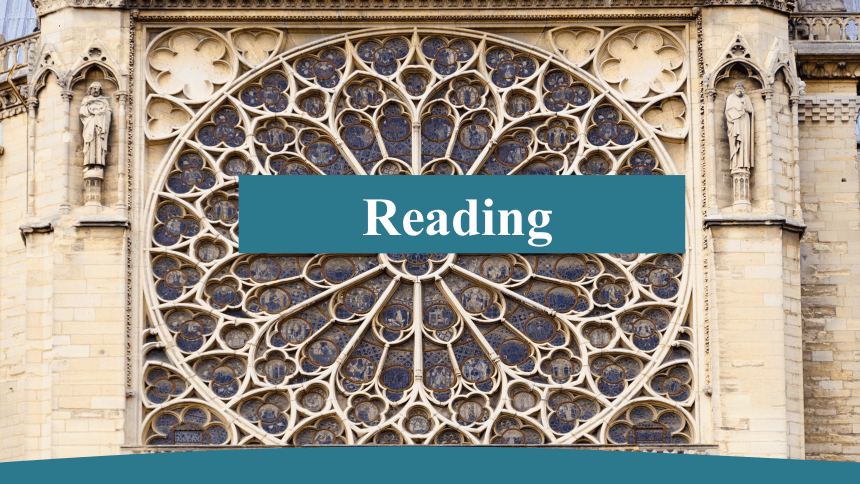
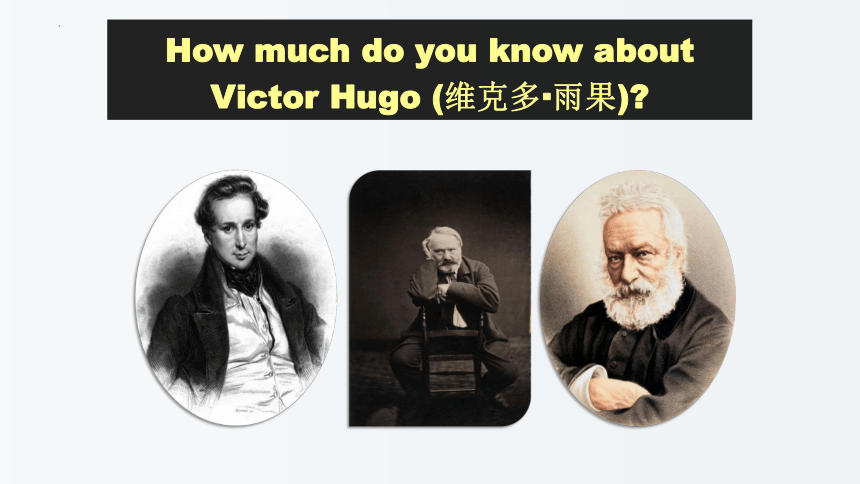
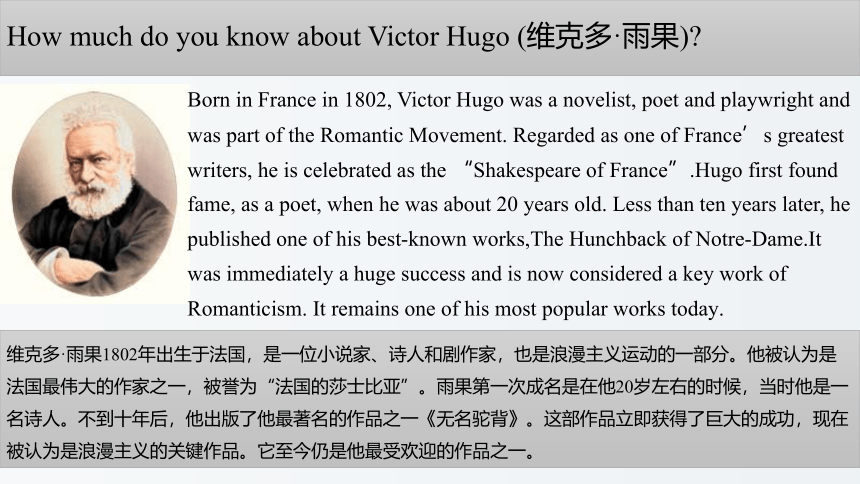
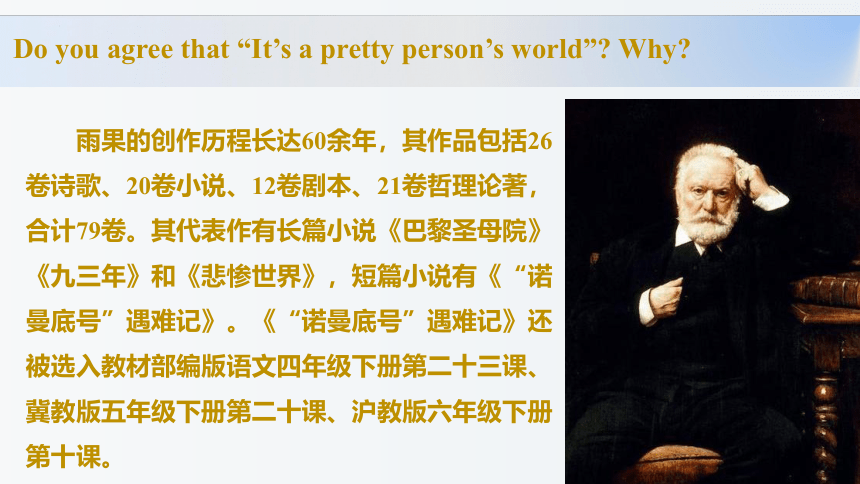

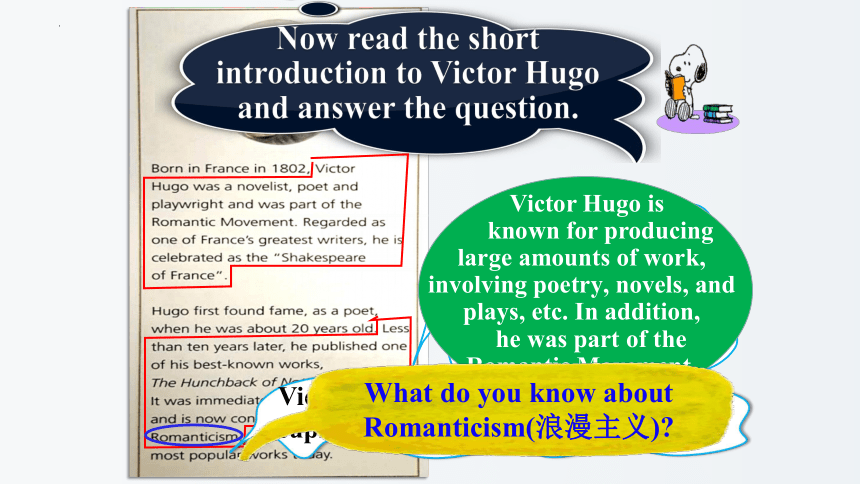
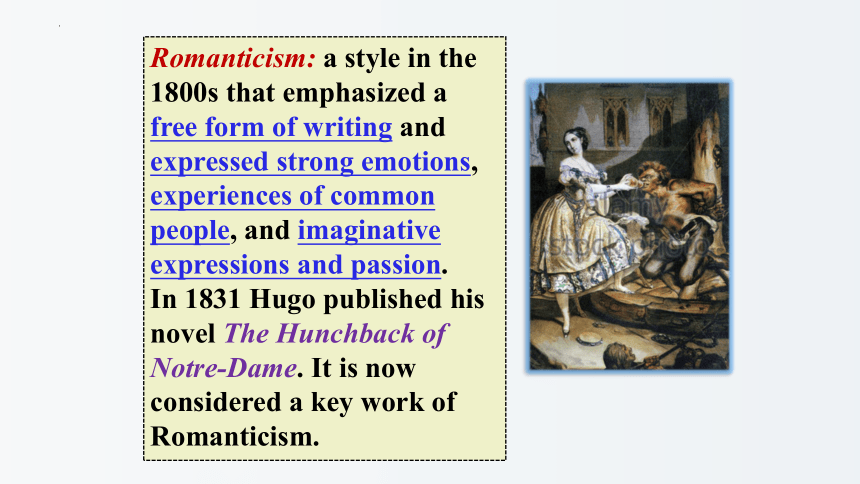
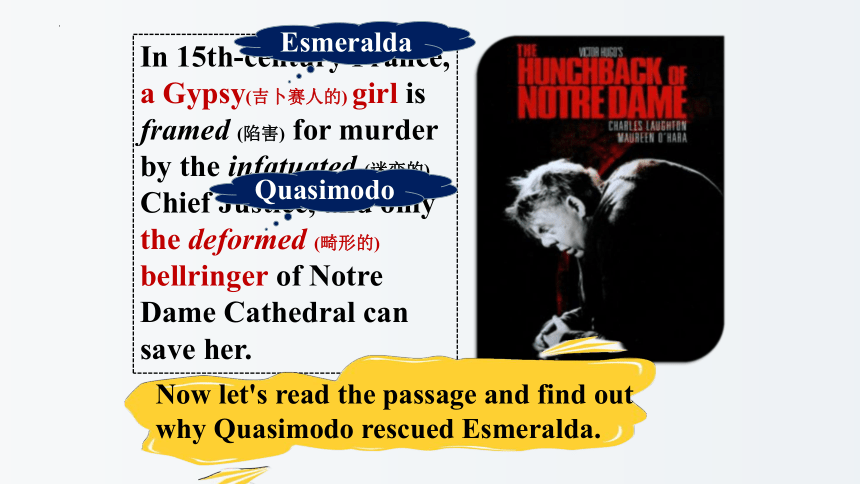
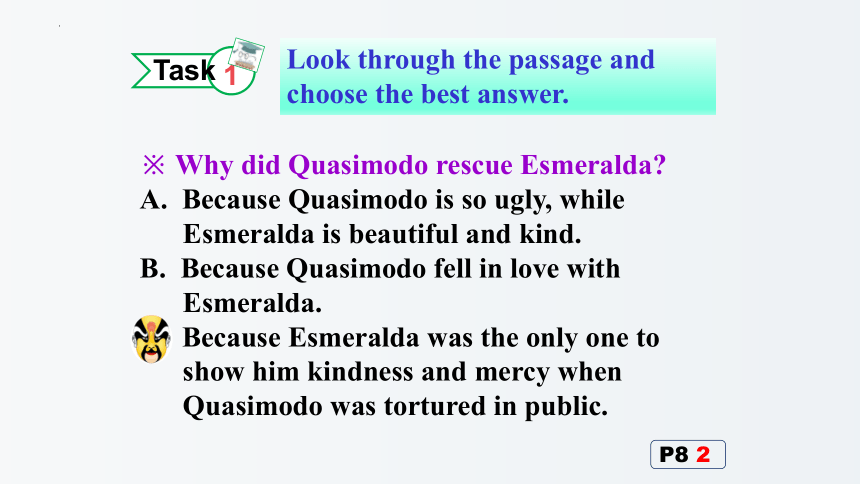
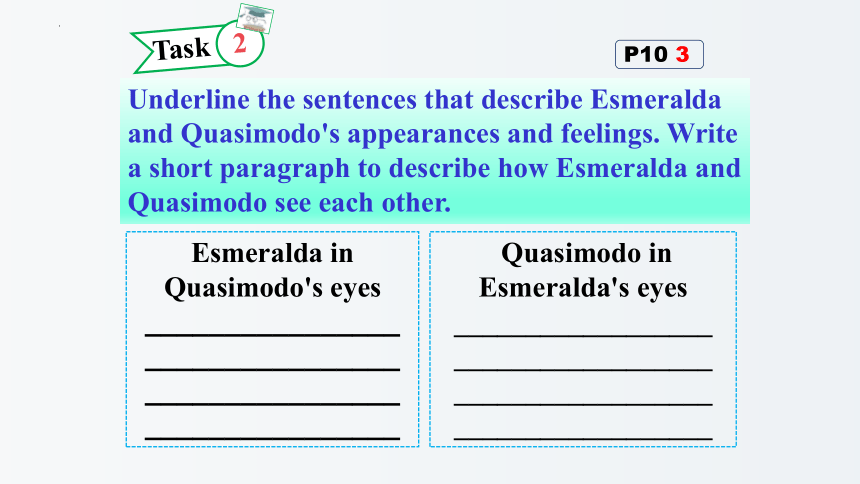
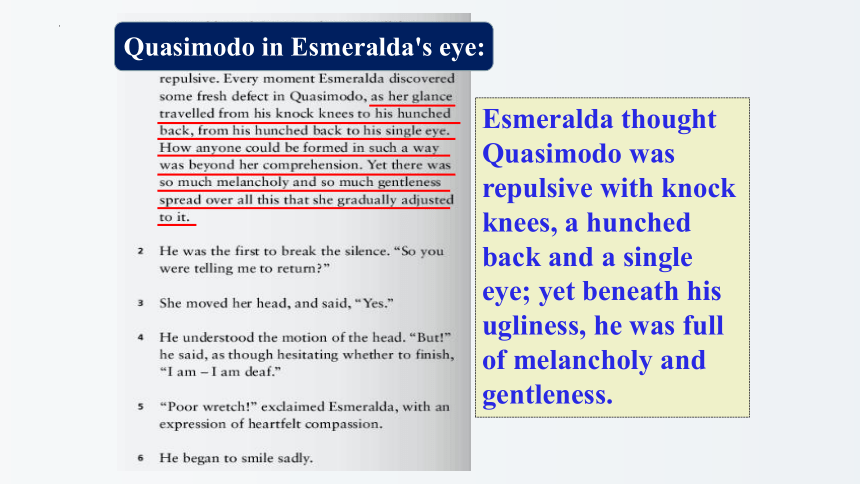
文档简介
(共62张PPT)
新外研社高中英语选择性必修三Unit1 Face Values
Developing Ideas
Reading
How much do you know about Victor Hugo (维克多·雨果)
How much do you know about Victor Hugo (维克多·雨果)
Born in France in 1802, Victor Hugo was a novelist, poet and playwright and was part of the Romantic Movement. Regarded as one of France’s greatest writers, he is celebrated as the “Shakespeare of France”.Hugo first found fame, as a poet, when he was about 20 years old. Less than ten years later, he published one of his best-known works,The Hunchback of Notre-Dame.It was immediately a huge success and is now considered a key work of Romanticism. It remains one of his most popular works today.
维克多·雨果1802年出生于法国,是一位小说家、诗人和剧作家,也是浪漫主义运动的一部分。他被认为是法国最伟大的作家之一,被誉为“法国的莎士比亚”。雨果第一次成名是在他20岁左右的时候,当时他是一名诗人。不到十年后,他出版了他最著名的作品之一《无名驼背》。这部作品立即获得了巨大的成功,现在被认为是浪漫主义的关键作品。它至今仍是他最受欢迎的作品之一。
Do you agree that “It’s a pretty person’s world” Why
雨果的创作历程长达60余年,其作品包括26卷诗歌、20卷小说、12卷剧本、21卷哲理论著,合计79卷。其代表作有长篇小说《巴黎圣母院》《九三年》和《悲惨世界》,短篇小说有《“诺曼底号”遇难记》。《“诺曼底号”遇难记》还被选入教材部编版语文四年级下册第二十三课、冀教版五年级下册第二十课、沪教版六年级下册第十课。
《巴黎圣母院》
内容简介:
“丑在美的旁边,畸形靠近优美,粗俗藏在崇高的背后,恶与善并存,黑暗和光明与共。”
《巴黎圣母院》是雨果浪漫主义小说杰作,艺术地再现了四百多年前法王路易十一统治时期的历史真实,作者将可歌可泣的故事和生动丰富的戏剧性场面有机地连缀起来,浪漫主义色彩浓烈,是运用浪漫主义对照原则的艺术范本。
《巴黎圣母院》体现了雨果的“美丑对照”的艺术表现原则,它的发表,打破了伪古典主义的桎梏,标志着浪漫主义的胜利。
Why do you think Victor Hugo is known as the “Shakespeare of France”
Victor Hugo is
known for producing
large amounts of work, involving poetry, novels, and plays, etc. In addition,
he was part of the Romantic Movement.
Now read the short introduction to Victor Hugo and answer the question.
Victor Hugo is regarded by many as the supreme poet of French Romanticism.
What do you know about Romanticism(浪漫主义)
Romanticism: a style in the 1800s that emphasized a free form of writing and expressed strong emotions, experiences of common people, and imaginative expressions and passion.
In 1831 Hugo published his novel The Hunchback of Notre-Dame. It is now considered a key work of Romanticism.
In 15th-century France, a Gypsy(吉卜赛人的) girl is framed (陷害) for murder by the infatuated (迷恋的) Chief Justice, and only the deformed (畸形的) bellringer of Notre Dame Cathedral can save her.
Esmeralda
Quasimodo
Now let's read the passage and find out why Quasimodo rescued Esmeralda.
※ Why did Quasimodo rescue Esmeralda
A. Because Quasimodo is so ugly, while
Esmeralda is beautiful and kind.
B. Because Quasimodo fell in love with
Esmeralda.
C. Because Esmeralda was the only one to
show him kindness and mercy when
Quasimodo was tortured in public.
Task
1
Look through the passage and choose the best answer.
P8 2
P10 3
Underline the sentences that describe Esmeralda and Quasimodo's appearances and feelings. Write a short paragraph to describe how Esmeralda and Quasimodo see each other.
Task
2
Esmeralda in Quasimodo's eyes
________________
________________
________________
________________
Quasimodo in Esmeralda's eyes
__________________
__________________
__________________
__________________
Quasimodo in Esmeralda's eye:
Esmeralda thought Quasimodo was repulsive with knock knees, a hunched back and a single
eye; yet beneath his ugliness, he was full of melancholy and gentleness.
Esmeralda in Quasimodo's eye:
Quasimodo thought Esmeralda was graceful and exquisitely beautiful, like a ray of sunshine, a drop of dew or a birdsong.
Task
3
Read the passage again and discuss the following question.
How did Esmeralda's feelings towards Quasimodo change
P10 3
thought he was horrible
felt sympathetic towards him
knew him better
was patient with him and was moved by him
Task
4
What does the sentence “A tear swam in the eye of Quasimodo, but did not fall” tell us about Quasimodo's personality
P10 4
Think & Share.
On one hand, it shows that Quasimodo is sensitive and gentle; on the other hand, it shows his strength and pride.
Quasimodo:
Esmeralda:
kind, beautiful,
warm-hearted,
sympathetic
ugly,unfortunate, kind ,brave.
appearance: repulsive--
knock knees, ________ back; single eye; horrible; poor unfortunate monster; savage creature; coarser, downtrodden and plainer than a pebble.
actions: smiled sadly; began to laugh;
a tear in the eye
words: the first to break the ________. ...that is more than I can repay with my life.
feelings: an immense pity;
appearance: graceful; exquisite beauty; a ray of sunshine, a drop of dew, a birdsong;
words: “Poor wretch”
feeling: beyond her ______________; there was melancholy and ___________; listen to him with _________tenderness.
hunched
silence
The Hunchback of Notre-Dame
hero & character
description
gentleness
comprehension
profound
Fill in the blanks and try to retell the passage according to them.
Post reading
analyzing, summary and retelling
Give a talk about the character in the passage that makes the greatest impression on you.Organize your ideas by considering the questions.
After reading
What is the character like
___________________________________
Has he/she experienced any emotional
changes If so, what changes are they
___________________________________
What can you learn from him/her
___________________________________
The impressive
character
character
emotional changes
something you've learned
2
3
Present your ideas in your group.
ugly, disloyal, clever, warm-hearted,
sympathetic, upright, serious, selfless ...
thought he was horrible -felt sympathetic towards him-knew him better-was patient with him and was moved by him
Collect all your group's ideas and present them to the class.
inner beauty,...
1. What difficulties might people like
Quasimodo face in the real world How
should people treat them
2. Predict what happens next. Share your ideas
with the class. Read the novel and check
your prediction.
P10 4
Discussion
In what different ways do the two reading passages in this unit raise our awareness of physical appearance and personal qualities
◆ The first passage shows the true meaning of beauty. Though how you present yourself to others plays a part, accepting yourself and feeling confident about your physical appearance are most important.
◆ The second passage highlights how someone's physical appearance can actually be a complete contrast to who they are on the inside.
Conclusion
Language Points
1. Esmeralda hears his call for water, and steps forwards out of mercy.
埃斯梅拉达听到他对水的呼唤,怜悯之心油然而生。
out of mercy: take pity on 出于怜悯
eg I don’t want anybody to help me out of mercy.
我不想任何人出于怜悯来帮助我。
(1) have a mercy on 对……怜悯
show mercy to 对……怜悯
ask for/ beg for mercy 请求/乞求宽恕
at the mercy of 任凭……摆布
without mercy 毫不留情地,残忍地
It’s mercy that… 幸运的是……
(2) merciful adj. 仁慈的,宽恕的,宽容的
be merciful to 对……仁慈
【归纳拓展】
【语境应用】完成句子。
1) It was quite urgent. The ship and its crew were ________________ (任凭……摆布) the rough sea.
2) The boy was screaming and __________________ (乞求宽恕).
3) _____________________ (幸运的是……) he survived the car crash.
at the mercy of
begging for mercy
It was a mercy that
2. Yet there was so much melancholy and so much gentleness spread over all this that she gradually adjusted to it.
但他表现出那样的忧郁与那样的温顺,她渐渐地适应了。
adjust to: become used to 适应……(to是介词)
eg He can’t adjust easily to the life in North China.
他难以适应中国北方的生活。
I haven’t adjusted to living on my own.
我还没有适应独自生活。
adjust oneself to 使自己适应……
adjust sth to sth 调整……以适应……
eg They will quickly adjust themselves to the school life.
他们将很快适应学校生活。
You can adjust the seat belt to the size you want.
你可以根据自己的需要调整安全带。
【归纳拓展】
【语境应用】单句语法填空。
1) He adjusted to _________ (live) in the remote village.
2) Adjust your language _______ the age of your audience.
living
to
3. He was the first to break the silence.
the + 序数词(+名词)+ 不定式
当被修饰词是序数词或被序数词修饰时,通常用不定式作后置定语。被修饰词与不定式之间是逻辑上的主谓关系。此外,被修饰词被形容词最高级或the only, the very, the last等修饰时也通常用不定式作后置定语。
eg She is always the first to answer questions.
她总是第一个回答问题。
He is the best man to choose. 他是最好的人选。
He would be the last to agree to the plan.
他决不会同意这项计划。
(1) 不定式作定语 通常放在被修饰词的后面,与被修饰词之间可有主谓、动宾或同位关系。
(2) 不定式与被修饰词存在动宾关系时,如果不定式是不及物动词,则后面应有必要的介词。
eg I usually have a lot of meetings to attend.
我通常有很多会议要参加
She is a nice person to work with.
她是个好同事。
(3) 常接不定式作定语的名词有ability, ambition, attempt, chance, decision, effort, moment, need, plan, promise, reason, time, way等。
eg Please make an effort to catch the bus.
请努力赶上公共汽车。
He made a promise to come here on time tomorrow.
他答应明天准时来这里。
【语境应用】单句语法填空。
1) I want to get something ________ (read) during the vacation.
2) We have a lot of things _______ (do), but packing is at the top of the list.
3) They are always the first ________ (bear) hardship and the last _________ (enjoy) comfort.
4) This will be a good opportunity ___________ (exchange) experience.
5) That will be the only thing ________ (do) now.
6) We must have the courage ______ (say) that we are ignorant.
to read
to do
to bear
to enjoy
to exchange
to do
to say
4. “But!” he said, as though hesitating whether to finish, “I am I am deaf.”
“但是!”他说,似乎犹豫着要不要说下去,“我是……我是聋子。”
as though hesitating whether to finish是让步状语从句的省略,补充完整是as though he was hesitating whether to finish。
当时间、条件、让步、方式等状语从句的主语与主句主语一致(或从句主语是it),且从句谓语含有be动词时,可以把从句主语和be动词一起省略。状语从句省略后的结构:连词+现在分词/ 过去分词/ 不定式/ 介词短语/ 名词/ 形容词/ 副词。
eg When (she was) walking along the river bank, she was singing a pop song.她沿着河堤边走边唱着流行歌曲。
Don’t come in until (you are) asked to.没叫你就别进来。
If (you are) in doubt, consult your doctor.
如有疑问,咨询医生。
If (it is) possible, he will help you out of the difficulty.
如果可能的话,他会帮你摆脱困境。
You must attend the meeting unless (it is) inconvenient to you.
除非不方便,否则你必须出席这次会议。
【语境应用】单句语法填空。
1) When _________ (live) in London, I picked up English.
2) If ________ (accept) for the job, you’ll be informed soon.
3) Video games can be a poor influence if _________ (leave) in the wrong hands.
4) She stood at the gate as if ________ (wait) for someone.
5) Unless _________ (invite), I won’t take part in it.
6) Although _______ (do) his best in maths these days, he has still got no good mark.
7) He stood up as if _______ (say) something.
living
accepted
left
waiting
invited
doing
to say
5. Never have I viewed my ugliness as at the present moment.
我从来没像现在这般明白自己的丑陋。
否定词never置于句首,句子使用了部分倒装语序,即把助动词have放在主语I 的前面。
当表示否定意义的词或短语置于句首时,句子用部分倒装语序,即把助动词、情态动词或系动词be移至主语之前。这样的词或短语有never, neither, nor, seldom, little, hardly, rarely, scarcely, at no time, by no means, in no way以及not only… but also…, no sooner… than…, hardly…when…等。
eg Never in all my life have I seen such a horrible thing.
我一辈子没见过这么恐怖的事。
Seldom does he go out for dinner.
他很少出去吃饭。
Little does he realize how important this meeting is.
他没有意识到这个会议的重要性。
【语境应用】完成句子。
1) Hardly _____________ (我注意到) that the holiday is going by.
2) Never ______________ (我看到过) such a beautiful vase before.
3) Seldom __________________ (她丧失信心) when she is in trouble.
4) Rarely ___________ (我看过) such an amazing performance.
5) In no way _______________________ (我对……负责) what has happened.
do I notice
have I seen
does she lose heart
have I seen
am I responsible for
6) Not only _______________________ (他对绘画感兴趣), but he also teaches his son how to draw.
7) I will never know what was on his mind at the time; ________________________ (其他任何人也不知道).
is he interested in painting
nor/ neither will anyone else
6. When I compare myself to you, I feel an immense pity for myself, poor unfortunate monster that I am!
当我把自己同你比较时,我就非常怜悯自己,我是多么可怜而不幸的怪物啊!
compare… to…: ① compare… with… 把……与……相比
② regard as similar or equal to 把……比作……
eg We carefully compared the first report to/ with the second.
我们仔细比较了第一份报告和第二份报告。
Books are often compared to our friends.
书籍常常被比喻为我们的朋友。
【注意】
compare与介词with, to搭配时意义有所不同,但compared with和compared to在句中作状语时意义相同,都表示“与……相比”。
eg He is much more brilliant, compared with/ to what he was before studying at college.
与上大学之前相比,他现在有才华多了。
【归纳拓展】
compare notes (with sb)(和某人)交换看法/ 交换意见
beyond compare 无与伦比
compare and contrast 比较与对比
【语境应用】单句语法填空。
1) People often compare a teacher _______ a gardener who takes great care of various plants.
2) When we compare our films _______ foreign ones, we find many differences.
3) Film has a much shorter history, especially when _________ (compare) to such art forms as music and painting.
4) When __________ (compare) different cultures, we often pay attention only to the differences without noticing their similarities.
to
with/to
compared
comparing
7. You have forgotten an unfortunate person who attempted to kidnap you one night…
你忘了,有天晚上,有个坏家伙想绑架你……
attempt to do sth: 试图做某事
eg The police attempted to link the case to the strange phenomenon.
警察试图把这起案件与这种奇怪的现象联系在一起。
make an attempt to do sth/ at doing sth 试图做某事
in an attempt to do sth 为了做某事
at the first/ second attempt 第一/ 二次尝试
【归纳拓展】
词条 不同点
attempt to do sth 常指一次而不是持续尝试,往往暗示达不到目的。
try do do sth 指为某事付出努力或代价,但不一定成功。
manage to do sth 指设法做成某事,强调结果,相当于 succeed in doing sth。
【语境应用】单句语法填空。
1) He attempted _________ (get) in touch with them but failed.
2) He succeeded in his attempt _______ (break) the world record.
3) She made a few half-hearted attempts ________ join in their conversation.
4) somehow, he managed ___________ (persuade) Kay to buy one for him.
to get
to break
to join
to persuade
Writing
Read the introduction to the novel and answer the
questions.
Pre-writing
This book by Oscar Wilde tells the story of Dorian Gray, a very handsome young man who spends his life only concerned with his own pleasure, regardless of the
suffering he brings to others.
The Picture of Dorian Gray
Pre-writing
The story starts with young Dorian having his portrait painted. His friend Lord Wotton talks about beauty and pleasure being the only important things in life. Fascinated by his words, Dorian wishes he could remain young and good-looking always, with his portrait growing old instead of him.
Read the introduction to the novel and answer the
questions.
Pre-writing
1. What kind of person is Dorian Gray
2. What message do you think the novel conveys
Read the introduction to the novel and answer the
questions.
Analyse the introduction to the novel.
Pre-writing
How many parts can we divide the introduction into
Part 1
Part 2
Part 3
Para 1
Para 2-4
Para 5
Pre-writing
The introduction to the novel consists of three elements:
1. General information
2. Plot
3. Central theme(s)
Analyse the introduction to the novel.
The second part introduced the main information based on ________________, with _________________ expressions to clarify the development and the ending of the story. Plot
Pre-writing
The story starts with young Dorian having his portrait painted … Soon afterwards, Dorian is surprised … He hides the painting away so that no one else may see it. For the next 18 years …
the time order
simple and brief
Analyse the introduction to the novel.
The third part is _____________________________. Central theme
Pre-writing
In the story, what matters most to Dorian Gray is that he is good-looking, not that he has a good heart. He sacrifices his true self in pursuit of physical beauty and pleasure, which leads to his destruction in the end.
the summary of the character
Analyse the introduction to the novel.
Choose another literary work with a focus on physical appearances and personal qualities, such as The Hunchback of Notre-Dame, and complete the notes.
While-writing: Writing
General information: _______________________
Plot: ______________________________________
Central theme(s): ___________________________
Now write about this literary work based on your notes.
While-writing: Writing
Post-writing: Reference Text
Jane Eyre
Jane Eyre, written by Charlotte Bronte and first published in 1847, tells the timeless story of the love between a poor young governess and a rich and mysterious gentleman.
n 女家庭教师
adj 神秘莫测的
Post-writing: Reference Text
After leaving the orphanage where she has spent most of her childhood, Jane Eyre goes to work as the governess of the daughter of a wealthy but troubled landowner. As she comes to know the great house and the people who live and work within it, Jane begins to uncover the secret responsible for Rochester’s temper and reticence. They fall in love, but just when their happily ever after seems to be in sight, that secret threatens to tear them apart.
n 孤儿院
n 沉默寡言
Post-writing: Reference Text
Jane Eyre looks at how people should not be underestimated because of the way they look — Jane might be small and plain, but she is also strong, courageous and independent. Although she is a woman and from a lower social class than Rochester, she wants to prove herself his equal in spirit.
v 低估
adj 有勇气的
新外研社高中英语选择性必修三Unit1 Face Values
Developing Ideas
Reading
How much do you know about Victor Hugo (维克多·雨果)
How much do you know about Victor Hugo (维克多·雨果)
Born in France in 1802, Victor Hugo was a novelist, poet and playwright and was part of the Romantic Movement. Regarded as one of France’s greatest writers, he is celebrated as the “Shakespeare of France”.Hugo first found fame, as a poet, when he was about 20 years old. Less than ten years later, he published one of his best-known works,The Hunchback of Notre-Dame.It was immediately a huge success and is now considered a key work of Romanticism. It remains one of his most popular works today.
维克多·雨果1802年出生于法国,是一位小说家、诗人和剧作家,也是浪漫主义运动的一部分。他被认为是法国最伟大的作家之一,被誉为“法国的莎士比亚”。雨果第一次成名是在他20岁左右的时候,当时他是一名诗人。不到十年后,他出版了他最著名的作品之一《无名驼背》。这部作品立即获得了巨大的成功,现在被认为是浪漫主义的关键作品。它至今仍是他最受欢迎的作品之一。
Do you agree that “It’s a pretty person’s world” Why
雨果的创作历程长达60余年,其作品包括26卷诗歌、20卷小说、12卷剧本、21卷哲理论著,合计79卷。其代表作有长篇小说《巴黎圣母院》《九三年》和《悲惨世界》,短篇小说有《“诺曼底号”遇难记》。《“诺曼底号”遇难记》还被选入教材部编版语文四年级下册第二十三课、冀教版五年级下册第二十课、沪教版六年级下册第十课。
《巴黎圣母院》
内容简介:
“丑在美的旁边,畸形靠近优美,粗俗藏在崇高的背后,恶与善并存,黑暗和光明与共。”
《巴黎圣母院》是雨果浪漫主义小说杰作,艺术地再现了四百多年前法王路易十一统治时期的历史真实,作者将可歌可泣的故事和生动丰富的戏剧性场面有机地连缀起来,浪漫主义色彩浓烈,是运用浪漫主义对照原则的艺术范本。
《巴黎圣母院》体现了雨果的“美丑对照”的艺术表现原则,它的发表,打破了伪古典主义的桎梏,标志着浪漫主义的胜利。
Why do you think Victor Hugo is known as the “Shakespeare of France”
Victor Hugo is
known for producing
large amounts of work, involving poetry, novels, and plays, etc. In addition,
he was part of the Romantic Movement.
Now read the short introduction to Victor Hugo and answer the question.
Victor Hugo is regarded by many as the supreme poet of French Romanticism.
What do you know about Romanticism(浪漫主义)
Romanticism: a style in the 1800s that emphasized a free form of writing and expressed strong emotions, experiences of common people, and imaginative expressions and passion.
In 1831 Hugo published his novel The Hunchback of Notre-Dame. It is now considered a key work of Romanticism.
In 15th-century France, a Gypsy(吉卜赛人的) girl is framed (陷害) for murder by the infatuated (迷恋的) Chief Justice, and only the deformed (畸形的) bellringer of Notre Dame Cathedral can save her.
Esmeralda
Quasimodo
Now let's read the passage and find out why Quasimodo rescued Esmeralda.
※ Why did Quasimodo rescue Esmeralda
A. Because Quasimodo is so ugly, while
Esmeralda is beautiful and kind.
B. Because Quasimodo fell in love with
Esmeralda.
C. Because Esmeralda was the only one to
show him kindness and mercy when
Quasimodo was tortured in public.
Task
1
Look through the passage and choose the best answer.
P8 2
P10 3
Underline the sentences that describe Esmeralda and Quasimodo's appearances and feelings. Write a short paragraph to describe how Esmeralda and Quasimodo see each other.
Task
2
Esmeralda in Quasimodo's eyes
________________
________________
________________
________________
Quasimodo in Esmeralda's eyes
__________________
__________________
__________________
__________________
Quasimodo in Esmeralda's eye:
Esmeralda thought Quasimodo was repulsive with knock knees, a hunched back and a single
eye; yet beneath his ugliness, he was full of melancholy and gentleness.
Esmeralda in Quasimodo's eye:
Quasimodo thought Esmeralda was graceful and exquisitely beautiful, like a ray of sunshine, a drop of dew or a birdsong.
Task
3
Read the passage again and discuss the following question.
How did Esmeralda's feelings towards Quasimodo change
P10 3
thought he was horrible
felt sympathetic towards him
knew him better
was patient with him and was moved by him
Task
4
What does the sentence “A tear swam in the eye of Quasimodo, but did not fall” tell us about Quasimodo's personality
P10 4
Think & Share.
On one hand, it shows that Quasimodo is sensitive and gentle; on the other hand, it shows his strength and pride.
Quasimodo:
Esmeralda:
kind, beautiful,
warm-hearted,
sympathetic
ugly,unfortunate, kind ,brave.
appearance: repulsive--
knock knees, ________ back; single eye; horrible; poor unfortunate monster; savage creature; coarser, downtrodden and plainer than a pebble.
actions: smiled sadly; began to laugh;
a tear in the eye
words: the first to break the ________. ...that is more than I can repay with my life.
feelings: an immense pity;
appearance: graceful; exquisite beauty; a ray of sunshine, a drop of dew, a birdsong;
words: “Poor wretch”
feeling: beyond her ______________; there was melancholy and ___________; listen to him with _________tenderness.
hunched
silence
The Hunchback of Notre-Dame
hero & character
description
gentleness
comprehension
profound
Fill in the blanks and try to retell the passage according to them.
Post reading
analyzing, summary and retelling
Give a talk about the character in the passage that makes the greatest impression on you.Organize your ideas by considering the questions.
After reading
What is the character like
___________________________________
Has he/she experienced any emotional
changes If so, what changes are they
___________________________________
What can you learn from him/her
___________________________________
The impressive
character
character
emotional changes
something you've learned
2
3
Present your ideas in your group.
ugly, disloyal, clever, warm-hearted,
sympathetic, upright, serious, selfless ...
thought he was horrible -felt sympathetic towards him-knew him better-was patient with him and was moved by him
Collect all your group's ideas and present them to the class.
inner beauty,...
1. What difficulties might people like
Quasimodo face in the real world How
should people treat them
2. Predict what happens next. Share your ideas
with the class. Read the novel and check
your prediction.
P10 4
Discussion
In what different ways do the two reading passages in this unit raise our awareness of physical appearance and personal qualities
◆ The first passage shows the true meaning of beauty. Though how you present yourself to others plays a part, accepting yourself and feeling confident about your physical appearance are most important.
◆ The second passage highlights how someone's physical appearance can actually be a complete contrast to who they are on the inside.
Conclusion
Language Points
1. Esmeralda hears his call for water, and steps forwards out of mercy.
埃斯梅拉达听到他对水的呼唤,怜悯之心油然而生。
out of mercy: take pity on 出于怜悯
eg I don’t want anybody to help me out of mercy.
我不想任何人出于怜悯来帮助我。
(1) have a mercy on 对……怜悯
show mercy to 对……怜悯
ask for/ beg for mercy 请求/乞求宽恕
at the mercy of 任凭……摆布
without mercy 毫不留情地,残忍地
It’s mercy that… 幸运的是……
(2) merciful adj. 仁慈的,宽恕的,宽容的
be merciful to 对……仁慈
【归纳拓展】
【语境应用】完成句子。
1) It was quite urgent. The ship and its crew were ________________ (任凭……摆布) the rough sea.
2) The boy was screaming and __________________ (乞求宽恕).
3) _____________________ (幸运的是……) he survived the car crash.
at the mercy of
begging for mercy
It was a mercy that
2. Yet there was so much melancholy and so much gentleness spread over all this that she gradually adjusted to it.
但他表现出那样的忧郁与那样的温顺,她渐渐地适应了。
adjust to: become used to 适应……(to是介词)
eg He can’t adjust easily to the life in North China.
他难以适应中国北方的生活。
I haven’t adjusted to living on my own.
我还没有适应独自生活。
adjust oneself to 使自己适应……
adjust sth to sth 调整……以适应……
eg They will quickly adjust themselves to the school life.
他们将很快适应学校生活。
You can adjust the seat belt to the size you want.
你可以根据自己的需要调整安全带。
【归纳拓展】
【语境应用】单句语法填空。
1) He adjusted to _________ (live) in the remote village.
2) Adjust your language _______ the age of your audience.
living
to
3. He was the first to break the silence.
the + 序数词(+名词)+ 不定式
当被修饰词是序数词或被序数词修饰时,通常用不定式作后置定语。被修饰词与不定式之间是逻辑上的主谓关系。此外,被修饰词被形容词最高级或the only, the very, the last等修饰时也通常用不定式作后置定语。
eg She is always the first to answer questions.
她总是第一个回答问题。
He is the best man to choose. 他是最好的人选。
He would be the last to agree to the plan.
他决不会同意这项计划。
(1) 不定式作定语 通常放在被修饰词的后面,与被修饰词之间可有主谓、动宾或同位关系。
(2) 不定式与被修饰词存在动宾关系时,如果不定式是不及物动词,则后面应有必要的介词。
eg I usually have a lot of meetings to attend.
我通常有很多会议要参加
She is a nice person to work with.
她是个好同事。
(3) 常接不定式作定语的名词有ability, ambition, attempt, chance, decision, effort, moment, need, plan, promise, reason, time, way等。
eg Please make an effort to catch the bus.
请努力赶上公共汽车。
He made a promise to come here on time tomorrow.
他答应明天准时来这里。
【语境应用】单句语法填空。
1) I want to get something ________ (read) during the vacation.
2) We have a lot of things _______ (do), but packing is at the top of the list.
3) They are always the first ________ (bear) hardship and the last _________ (enjoy) comfort.
4) This will be a good opportunity ___________ (exchange) experience.
5) That will be the only thing ________ (do) now.
6) We must have the courage ______ (say) that we are ignorant.
to read
to do
to bear
to enjoy
to exchange
to do
to say
4. “But!” he said, as though hesitating whether to finish, “I am I am deaf.”
“但是!”他说,似乎犹豫着要不要说下去,“我是……我是聋子。”
as though hesitating whether to finish是让步状语从句的省略,补充完整是as though he was hesitating whether to finish。
当时间、条件、让步、方式等状语从句的主语与主句主语一致(或从句主语是it),且从句谓语含有be动词时,可以把从句主语和be动词一起省略。状语从句省略后的结构:连词+现在分词/ 过去分词/ 不定式/ 介词短语/ 名词/ 形容词/ 副词。
eg When (she was) walking along the river bank, she was singing a pop song.她沿着河堤边走边唱着流行歌曲。
Don’t come in until (you are) asked to.没叫你就别进来。
If (you are) in doubt, consult your doctor.
如有疑问,咨询医生。
If (it is) possible, he will help you out of the difficulty.
如果可能的话,他会帮你摆脱困境。
You must attend the meeting unless (it is) inconvenient to you.
除非不方便,否则你必须出席这次会议。
【语境应用】单句语法填空。
1) When _________ (live) in London, I picked up English.
2) If ________ (accept) for the job, you’ll be informed soon.
3) Video games can be a poor influence if _________ (leave) in the wrong hands.
4) She stood at the gate as if ________ (wait) for someone.
5) Unless _________ (invite), I won’t take part in it.
6) Although _______ (do) his best in maths these days, he has still got no good mark.
7) He stood up as if _______ (say) something.
living
accepted
left
waiting
invited
doing
to say
5. Never have I viewed my ugliness as at the present moment.
我从来没像现在这般明白自己的丑陋。
否定词never置于句首,句子使用了部分倒装语序,即把助动词have放在主语I 的前面。
当表示否定意义的词或短语置于句首时,句子用部分倒装语序,即把助动词、情态动词或系动词be移至主语之前。这样的词或短语有never, neither, nor, seldom, little, hardly, rarely, scarcely, at no time, by no means, in no way以及not only… but also…, no sooner… than…, hardly…when…等。
eg Never in all my life have I seen such a horrible thing.
我一辈子没见过这么恐怖的事。
Seldom does he go out for dinner.
他很少出去吃饭。
Little does he realize how important this meeting is.
他没有意识到这个会议的重要性。
【语境应用】完成句子。
1) Hardly _____________ (我注意到) that the holiday is going by.
2) Never ______________ (我看到过) such a beautiful vase before.
3) Seldom __________________ (她丧失信心) when she is in trouble.
4) Rarely ___________ (我看过) such an amazing performance.
5) In no way _______________________ (我对……负责) what has happened.
do I notice
have I seen
does she lose heart
have I seen
am I responsible for
6) Not only _______________________ (他对绘画感兴趣), but he also teaches his son how to draw.
7) I will never know what was on his mind at the time; ________________________ (其他任何人也不知道).
is he interested in painting
nor/ neither will anyone else
6. When I compare myself to you, I feel an immense pity for myself, poor unfortunate monster that I am!
当我把自己同你比较时,我就非常怜悯自己,我是多么可怜而不幸的怪物啊!
compare… to…: ① compare… with… 把……与……相比
② regard as similar or equal to 把……比作……
eg We carefully compared the first report to/ with the second.
我们仔细比较了第一份报告和第二份报告。
Books are often compared to our friends.
书籍常常被比喻为我们的朋友。
【注意】
compare与介词with, to搭配时意义有所不同,但compared with和compared to在句中作状语时意义相同,都表示“与……相比”。
eg He is much more brilliant, compared with/ to what he was before studying at college.
与上大学之前相比,他现在有才华多了。
【归纳拓展】
compare notes (with sb)(和某人)交换看法/ 交换意见
beyond compare 无与伦比
compare and contrast 比较与对比
【语境应用】单句语法填空。
1) People often compare a teacher _______ a gardener who takes great care of various plants.
2) When we compare our films _______ foreign ones, we find many differences.
3) Film has a much shorter history, especially when _________ (compare) to such art forms as music and painting.
4) When __________ (compare) different cultures, we often pay attention only to the differences without noticing their similarities.
to
with/to
compared
comparing
7. You have forgotten an unfortunate person who attempted to kidnap you one night…
你忘了,有天晚上,有个坏家伙想绑架你……
attempt to do sth: 试图做某事
eg The police attempted to link the case to the strange phenomenon.
警察试图把这起案件与这种奇怪的现象联系在一起。
make an attempt to do sth/ at doing sth 试图做某事
in an attempt to do sth 为了做某事
at the first/ second attempt 第一/ 二次尝试
【归纳拓展】
词条 不同点
attempt to do sth 常指一次而不是持续尝试,往往暗示达不到目的。
try do do sth 指为某事付出努力或代价,但不一定成功。
manage to do sth 指设法做成某事,强调结果,相当于 succeed in doing sth。
【语境应用】单句语法填空。
1) He attempted _________ (get) in touch with them but failed.
2) He succeeded in his attempt _______ (break) the world record.
3) She made a few half-hearted attempts ________ join in their conversation.
4) somehow, he managed ___________ (persuade) Kay to buy one for him.
to get
to break
to join
to persuade
Writing
Read the introduction to the novel and answer the
questions.
Pre-writing
This book by Oscar Wilde tells the story of Dorian Gray, a very handsome young man who spends his life only concerned with his own pleasure, regardless of the
suffering he brings to others.
The Picture of Dorian Gray
Pre-writing
The story starts with young Dorian having his portrait painted. His friend Lord Wotton talks about beauty and pleasure being the only important things in life. Fascinated by his words, Dorian wishes he could remain young and good-looking always, with his portrait growing old instead of him.
Read the introduction to the novel and answer the
questions.
Pre-writing
1. What kind of person is Dorian Gray
2. What message do you think the novel conveys
Read the introduction to the novel and answer the
questions.
Analyse the introduction to the novel.
Pre-writing
How many parts can we divide the introduction into
Part 1
Part 2
Part 3
Para 1
Para 2-4
Para 5
Pre-writing
The introduction to the novel consists of three elements:
1. General information
2. Plot
3. Central theme(s)
Analyse the introduction to the novel.
The second part introduced the main information based on ________________, with _________________ expressions to clarify the development and the ending of the story. Plot
Pre-writing
The story starts with young Dorian having his portrait painted … Soon afterwards, Dorian is surprised … He hides the painting away so that no one else may see it. For the next 18 years …
the time order
simple and brief
Analyse the introduction to the novel.
The third part is _____________________________. Central theme
Pre-writing
In the story, what matters most to Dorian Gray is that he is good-looking, not that he has a good heart. He sacrifices his true self in pursuit of physical beauty and pleasure, which leads to his destruction in the end.
the summary of the character
Analyse the introduction to the novel.
Choose another literary work with a focus on physical appearances and personal qualities, such as The Hunchback of Notre-Dame, and complete the notes.
While-writing: Writing
General information: _______________________
Plot: ______________________________________
Central theme(s): ___________________________
Now write about this literary work based on your notes.
While-writing: Writing
Post-writing: Reference Text
Jane Eyre
Jane Eyre, written by Charlotte Bronte and first published in 1847, tells the timeless story of the love between a poor young governess and a rich and mysterious gentleman.
n 女家庭教师
adj 神秘莫测的
Post-writing: Reference Text
After leaving the orphanage where she has spent most of her childhood, Jane Eyre goes to work as the governess of the daughter of a wealthy but troubled landowner. As she comes to know the great house and the people who live and work within it, Jane begins to uncover the secret responsible for Rochester’s temper and reticence. They fall in love, but just when their happily ever after seems to be in sight, that secret threatens to tear them apart.
n 孤儿院
n 沉默寡言
Post-writing: Reference Text
Jane Eyre looks at how people should not be underestimated because of the way they look — Jane might be small and plain, but she is also strong, courageous and independent. Although she is a woman and from a lower social class than Rochester, she wants to prove herself his equal in spirit.
v 低估
adj 有勇气的
